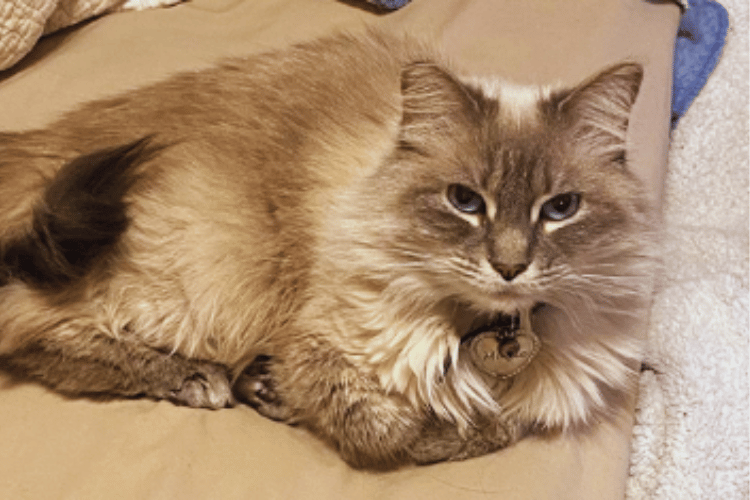Are you looking for an effective way to help keep your cat's skin healthy and prevent it from becoming itchy? If so, salmon oil may be the perfect solution!
Salmon oil is a natural supplement made from wild-caught salmon which provides essential Omega-3 fatty acid to cats’ diets. It helps promote overall good health and can even work wonders on conditions like dry, flaky or itchy skin.
In this article, we'll explore how salmon oil works, its potential benefits for cats with sensitive skin and what type of products are available on the market.
So if you want to learn more about using salmon oil to improve your cat's well-being—keep reading!

Does Salmon Oil Help Cats With Itchy Skin?
Itchy skin can be a frustrating and uncomfortable condition for cats, and their owners. While there are many over-the-counter remedies available, some pet owners are turning to natural remedies for relief.
One popular option is salmon oil, which is thought to aid in reducing inflammation and promoting healthy skin. In this section, we’ll explore whether or not salmon oil can help cats with itchy skin.
What is Salmon Oil?
Salmon oil is a popular supplement that is widely recognized for its health benefits. It is made from the fatty tissues of salmon and contains omega-3 and omega-6 fatty acids, which are essential for good health. Salmon oil is typically added to a cat’s diet as a liquid or in capsule form.
How Does Salmon Oil Help Cats With Itchy Skin?
The omega-3 and omega-6 fatty acids in salmon oil are believed to help reduce inflammation in the body. This can benefit cats with itchy skin because it is often caused by inflammation.
Additionally, salmon oil helps keep skin cells healthy by promoting moisture and elasticity. This can help prevent dry skin, which can lead to itching.
Studies on Salmon Oil and Itchy Skin in Cats
While there is no definitive research on salmon oil and itchy skin in cats, some studies suggest that it could be beneficial. A study conducted on dogs with atopic dermatitis found that supplementing with omega-3 fatty acids (found in salmon oil) reduced itching and inflammation.
While the study was conducted on dogs, many believe that the same benefits could apply to cats as well.
How to Add Salmon Oil to Your Cat’s Diet
If you’re interested in adding salmon oil to your cat’s diet, it’s important to do so gradually. Start with a small amount and gradually increase the dosage until you reach the recommended level.
Keep in mind that salmon oil can go rancid quickly, so it’s important to store the bottle in a cool, dark place and use it within a few months.

Other Solutions for Itchy Skin in Cats
While salmon oil may be helpful for some cats with itchy skin, it’s important to note that there is no one-size-fits-all solution. Before trying any new remedies or supplements, it’s always best to consult with your veterinarian.
They may be able to recommend additional treatments such as medicated shampoos, creams, or antihistamines.
In conclusion, while there is no definitive research on salmon oil and itchy skin in cats, many experts believe that it could be beneficial. The omega-3 and omega-6 fatty acids in salmon oil are believed to help reduce inflammation and promote healthy skin, making it a potential natural remedy.
However, as with any new supplement or treatment, it’s important to consult with your veterinarian before making any changes to your cat’s diet or healthcare routine. With their guidance, you can find the best solution for your cat’s itchy skin and keep them healthy and comfortable.
FAQs about Salmon Oil and its Effectiveness for Cats with Itchy Skin
Does your cat suffer from itchy skin? You are not alone - unfortunately, this is a common issue that many cats experience. But the silver lining to this itchiness might be in salmon oil!
While there's no miracle cure-all for every pet's unique needs, research suggests that salmon oil can work wonders when it comes to relieving and preventing skin irritation in cats.
In this FAQ section, we will answer some of the most commonly asked questions about using salmon oil for cats with itchy skin so you can make informed decisions with your furry friend’s health in mind!
What are the benefits of using salmon oil for cats with itchy skin?
Salmon oil is rich in omega-3 fatty acids, specifically EPA and DHA, which have anti-inflammatory properties. These fatty acids help reduce itchiness and inflammation, promoting healthier skin and a shinier coat for your cat. Additionally, salmon oil can support overall immune health and may alleviate symptoms related to dry skin, allergies, and dermatitis.
How much salmon oil should I give to my cat?
The recommended dosage of salmon oil for cats varies based on their weight and specific needs. As a general guideline, it is best to consult with your veterinarian to determine the appropriate dosage for your cat. Typically, the dosage ranges from 50-150mg of EPA/DHA per 10 pounds of body weight daily. Start with a lower dose and gradually increase it while monitoring your cat's response.
Is salmon oil safe for cats? Are there any potential side effects?
Salmon oil is generally safe for cats when given in the correct dosage. However, it is important to note that some cats may have sensitivities or allergies to fish products. Common side effects, although rare, may include gastrointestinal upset, diarrhea, or vomiting. If you notice any adverse reactions, discontinue use and consult your veterinarian.
What ingredients should I look for in a high-quality salmon oil for cats?
When choosing a salmon oil for your cat, look for products made from wild-caught salmon that are free from additives, preservatives, and artificial flavors. Additionally, ensure that the oil has undergone proper purification processes to remove any potential toxins or contaminants. Reading product labels and opting for reputable brands is key.
What is the best method to administer salmon oil to my cat?
Salmon oil can be administered to your cat in various ways. It is commonly available as a liquid or in soft gel capsules. You can drizzle the liquid form over your cat's food, making sure to mix it well. If using capsules, you can either puncture them and squeeze the oil onto the food or ask your veterinarian for guidance on administering the appropriate dosage.
All in all, salmon oil can be a great choice for cats who are suffering from an itchy scalp or skin. It may not work for every kitty, but with its abundance of powerful omega-3 fatty acids, it has the potential to truly improve your cat's overall health.
If your cat is experiencing frequent itchiness or any other symptom of a skin issue, it might be beneficial to try adding salmon oil into their daily routine.

As always, it’s important to consult your vet before trying any dietary changes to ensure your cat gets the safest and most optimal healthcare possible. Pet owners should also look for quality products that contain little fillers and are made from healthy and wild-caught fish.
Let's not forget that diet plays a big role in skin health and if you're looking for something more natural than medications or topical treatments, talk with your vet about introducing Salmon Oil into your kitty's meals.
Now that we know a bit more about its effects on both cats and humans alike, let’s give our cats the gift of salmon oil!
Thank you for visiting LegitLists we hope this helps you make a legitimate choice!






